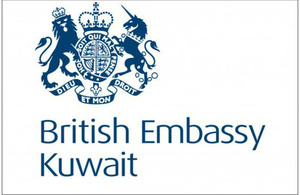British Embassy in Kuwait comments on the occasion of World Day against the Death Penalty
10 October is World Day Against the Death Penalty, British Embassy in Kuwait comments on the occasion

British Embassy Kuwait
10 October is World Day Against the Death Penalty, a day for people all over the world to make clear their opposition to this form of punishment. The British Government’s stance on the death penalty is clear: We believe that its use undermines human dignity; and any miscarriage of justice leading to its imposition is irreversible and irreparable. This is a position shared by all member states of the European Union.
In 2012, only 21 countries implemented death sentences – the lowest figure on record. With the UK’s long held stance against the death penalty so clear, 10 October is an opportunity to ask that our friends look again at their stance on this issue.
We know however that this is not an easy issue. In fact it was some time before the UK reached its current position. And it took two prominent miscarriages of justice to persuade Parliament to act: following the executions of Timothy Evans in 1950 and Derek Bentley in 1953, the state had to admit that mistakes had been made at both men’s trials, and both were posthumously pardoned. Parliament then took successive steps to restrict the use of the death penalty, and the last execution in the UK was in 1964. In 1998, under the influence of the European Convention on Human Rights, Parliament formally abolished the death penalty for all crimes.
In her comments on the issue, Senior Foreign Office Minister Baroness Warsi, who recently visited Kuwait, said:
Today is World Day against the Death Penalty 2013, an occasion to highlight the UK’s longstanding opposition to the death penalty in all circumstances. There have been positive developments over this past year, particularly at the United Nations last December where more states than ever before voted for a worldwide moratorium on the death penalty. However, there were also setbacks, including the resumption of executions in countries that had previously enjoyed lengthy periods without executions. The UK Government remains committed to working towards the worldwide abolition of the death penalty and will continue to make the case for abolition internationally, and to support those individuals and groups around the world who are campaigning locally for an end to the death penalty in their country.
3600 people were executed around the world in 2012. Whilst many of these crimes where among the most heinous, can we guarantee that no miscarriages of justice occurred? Can we point to a benefit in terms of deterrence? On 10 October, the UK lends its voice to those all around the world asking those same questions.